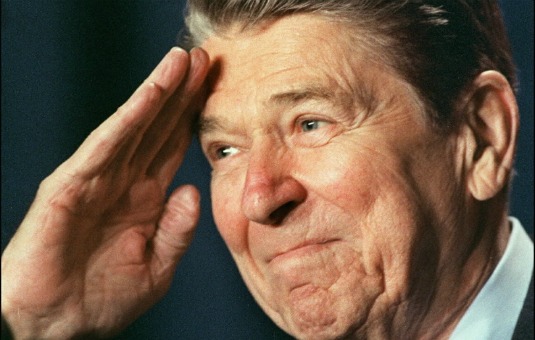Reagan: The Biggest RINO

What would the Club for Growth say about Ronald Reagan? We know what they think about Rick Perry since they have produced new Presidential White Papers on him. Their opinion: eh, not bad, but not great.
Now, keep in mind, the Club for Growth is hard to please. We are talking about Rick Perry, the governor of Texas. That is Texas, arguably one of the most conservative and freest of the market states in the country. The very place that George W. Bush helped to create a pro-business atmosphere. All he had to do was clock in and clock out and he gets an A, right?
What I find fascinating when I read the Club for Growth White Papers is that generally only politicians who aren't governors get great scores. The Club for Growth loves Michele Bachmann. That's mainly because she has the freedom to toe the ideological line. She has never been forced to balance a budget in a politically diverse environment. So if you are a governor, and especially a governor from a non-ideologically pure state, then prepare to get your hat handed to you by the Club for Growth.
With that being said, I thought it would be interested to imagine the White Papers for conservative icon Ronald Reagan. It might go as follows:
While Ronald Reagan showed promised early on in his presidency by passing em>one of the largest tax decreases in history<, he spent the rest of his presidency signing into law em>11 different tax increases<. These tax hikes were enacted with the goal of paying for government-run health insurance, such as Medicare. While the eleven tax hikes did not fully make up for that initial tax cut, we find Reagan's vulnerability to compromise somewhat alarming. True conservatives never increase taxes, much less 11 times.
In Reagan's eight years, the United States also went from em>being the world's largest international creditor to being the world's largest debtor<. In 1981, the deficit was $74 billion and the national debt was $930 billion. Within two years (because of the 1981 tax cut), the deficit was $208 billion. By the end of Reagan's presidency, the Gipper had allowed the national debt to spiral to $2.6 trillion. We at the Club for Growth find Reagan's utter disregard for our nation's finances troubling. What America needs is someone who reduces government, not increases it.
Again, while Reagan entered office with the kind of government-reducing rhetoric that the Club for Growth admires, he largely failed to follow through on his commitments. We find Reagan's creation of the Department of Veteran Affairs troublesome. Indeed, Reagan em>ended his presidency< with 60,000 more federal employees in the workforce. In 1983, Reagan agreed to $165 billion in government bailout money for the unconstitutional Social Security. Now is the not the time when the United States should bail out its government run programs. If Reagan's goal was to reduce government, then he utterly failed. America needs somebody who will stick it to Washington, not a government-loving RINO like Ronald Reagan.
Of course, we are not even going to go into Reagan's em>non budget-related indiscretions<, such as his granting amnesty to illegal immigrants, his states' rights crippling support of a federal minimum drinking age, and his 1981 "voluntary" export restraint on Japanese cars (the auto industry doesn't need more bailouts). And then there is his breath-taking em>support< of the Brady Bill, published on the pages of the ghastly New York Times. There is enough here alone to suggest that America would be better off without Reagan's big government policies.
We think that em>Dick Cheney< is wrong when when he stated that Reagan proved that deficits don't matter. America would be better off served by somebody like Michele Bachmann. She is ideologically pure.

